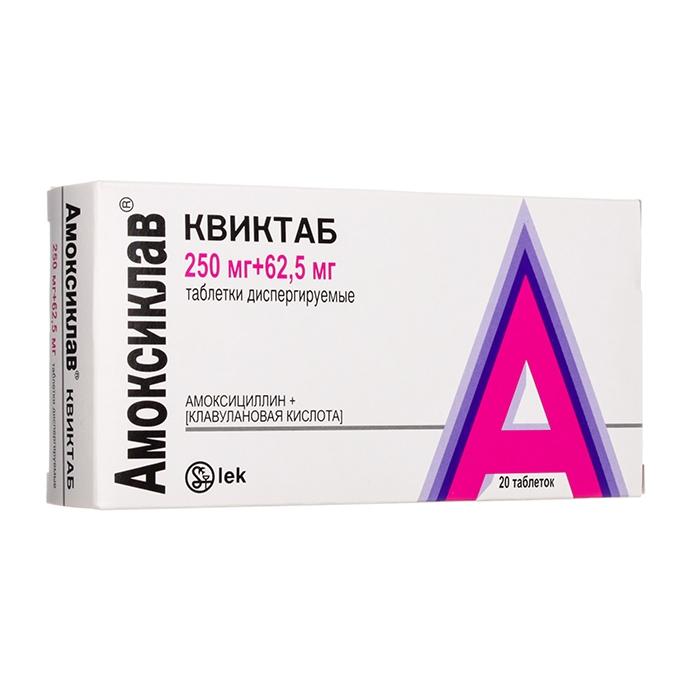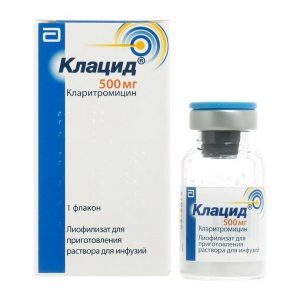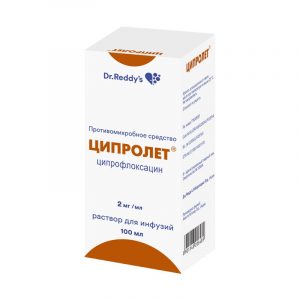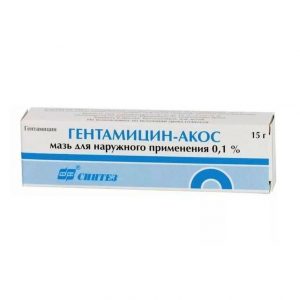Description
Release form
Dispersible tablets
Pharmacological action
Broad-spectrum antibiotic contains semisynthetic penicillin amoxicillin and an irreversible inhibitor of β-lactamase clavulanic acid. Clavulanic acid forms a stable inactivated complex with these enzymes and ensures the resistance of amoxicillin to the effects of -Lactamases produced by microorganisms.
Clavulanic acid, similar in structure to beta-lactam antibiotics, has a weak intrinsic antibacterial activity.
Amoxiclav is active against strains sensitive to amoxicillin, including strains producing -lactamases, including aerobic gram-positive bacteria: Streptococcus pneumoniae, Streptococcus pyogenes, Streptococcus viridans, Streptococcus bovis, Enterococcus spp., Staphylococcus aureus (except for methicillin-resistant strains), Staphylococcus sperm epidermidis, except for methicillococcus sphyptis. aerobic gram-negative bacteria: Bordetella pertussis, Brucella spp., Campylobacter jejuni, Escherichia coli, Gardnerella vaginalis, Haemophilus ducreyi, Haemophilus influenzae, Helicobacter pylori, Klebsiella spp., Moraalorhera cat Neisseria meningitidis, Pasteurella multocida, Proteus spp., Salmonella spp., Shigella spp., Vibrio cholerae, Yersinia enterocolitica, Eikenella corrodens gram-positive anaerobes: Peptococcus spp., Peptostreptococcus spp., Clostium, Prestrom, Actida ., gram-negative anaerobes: Bacteroides spp.
Indications
Treatment of infectious and inflammatory diseases, caused by drug-sensitive microorganisms:
– infections of the upper respiratory tract and ENT organs (including acute and chronic sinusitis, acute and chronic otitis media, pharyngeal abscess, tonsillitis, pharyngitis)
– infections of the lower respiratory tract (in including acute bronchitis with bacterial superinfection, chronic bronchitis, pneumonia)
– urinary tract infections
– gynecological infections
– infections of the skin and soft tissues, including human and animal bites
– bone infections and connect noy
fabric – biliary tract infection (cholecystitis, cholangitis)
– odontogenic infection.
Use during pregnancy and lactation
Amoxiclav Quicktab can be used during pregnancy if there are clear indications.
Amoxicillin and clavulanic acid in small quantities are excreted in breast milk.
Special instructions
During the course of treatment, the functions of the hematopoietic organs, liver and kidneys should be monitored.
In patients with severe impaired renal function, an adequate correction of the dosage regimen or an increase in the interval between doses of the drug is required.
In order to reduce the risk of adverse reactions from the gastrointestinal tract, the drug should be taken at the beginning of a meal.
When using Amoxiclav Quicktab, a false-positive reaction is possible when determining the level of glucose in the urine when using Benedict’s reagent or Felling’s solution (enzymatic reactions with glucosidase are recommended).
Influence on the ability to drive vehicles and control mechanisms
There is no evidence of a negative effect of Amoxiclav Quicktab in recommended doses on the ability to drive vehicles and control mechanisms.
Composition
1 tab.
amoxicillin trihydrate 287 mg,
which corresponds to the content of amoxicillin 250 mg
potassium clavulanate 74.4 mg,
which corresponds to the content of clavulanic acid (in the form of potassium clavulanate) 62.5 mg
Excipients: crospovidone di-7. orange – 19.7 mg, microcrystalline silicon-containing cellulose – 49.2 mg, sucralose – 2.7 mg, sodium stearyl fumarate – 14.3 mg, iron (III) oxide yellow (E172) – 0.6 mg, mannitol – 167.4 mg.
Dosage and Administration
Inside. Tablets must be dissolved in half a glass of water (at least 30 ml) and mixed thoroughly, drink. It is possible to hold the tablets in the mouth until completely dissolved, and then swallow. In order to reduce the risk of side effects from the gastrointestinal tract, the drug should be taken at the beginning of a meal.
Adults and children over 12 years of age (body weight> 40 kg) for mild or moderate infections, 1 tab. (625 mg) every 12 hours, in case of severe infection and respiratory tract infections – 1 tab. (625 mg) every 8 hours or 1 tab. (1000 mg) every 12 hours.
Duration of treatment – up to 14 days.
If treatment is started with parenteral administration, Amoxiclav® Quicktab tablets may be continued.
In accordance with the severity of functional renal impairment, the dose of the drug should be reduced and / or the interval of use should be increased. In renal failure of moderate severity (CC 10-30 ml / min) appoint 1 tab. (625 mg) every 12 hours. In case of severe renal failure (CC
Side effects
Side effects in most cases are mild and transient.
From the digestive system: loss of appetite, nausea, vomiting, diarrhea rarely – increased activity of liver enzymes (ALT, AST), increased levels of alkaline phosphatase, violations of liver function in isolated cases – cholestatic jaundice, hepatitis, pseudomembranous colitis.
From the side of the central nervous system: dizziness, headache is very rare – convulsions (can occur in patients with impaired renal function when taking the drug in high doses).
From the hemopoietic system: rarely – reversible leukopenia (including neutropenia), thrombocytopenia very rarely – hemolytic anemia, reversible increase in prothrombin time (when combined with anticoagulants).
From the urinary system: very rarely – interstitial nephritis, crystalluria.
Allergic reactions: erythematous rash, itching, urticaria are very rare – multiforme exudative erythema, angioedema, anaphylactic shock, allergic vasculitis in isolated cases – exfoliative dermatitis, Stevens-Johnson syndrome, toxic epidermal necrolysis, acute generalized exanthematous pustulosis.
Other: rarely – development of superinfection (including candidiasis).
Drug interaction
With the simultaneous use of the drug Amoxiclav Quiktab with antacids, glucosamine, laxatives, aminoglycosides absorption slows down, with ascorbic acid – increases.
Diuretics, allopurinol, phenylbutazone, NSAIDs and other drugs that block tubular secretion increase the concentration of amoxicillin (clavulanic acid is excreted mainly by glomerular filtration).
With the simultaneous use of Amoxiclav Quiktab enhances the toxicity of methotrexate.
With the simultaneous use of the drug Amoxiclav Quiktab with allopurinol, the incidence of exanthema increases.
The simultaneous use of Amoxiclav Quiktab with disulfiram should be avoided.
In some cases, taking the drug can lengthen the prothrombin time, therefore, caution should be exercised while prescribing anticoagulants and the drug Amoxiclav Quicktab.
The combination of amoxicillin with rifampicin is antagonistic (there is a mutual weakening of the antibacterial effect).
Amoxiclav Quicktab should be used several hours before taking bacteriostatic antibiotics (macrolides, tetracyclines), sulfonamides.
Probenecid reduces the excretion of amoxicillin, increasing its serum concentration.
Amoxiclav Quicktab reduces the effectiveness of oral contraceptives.
Overdose
There are no reports of death or life-threatening side effects due to an overdose of the drug.
Symptoms: disorders of the gastrointestinal tract – abdominal pain, diarrhea, vomiting, anxious agitation, insomnia, dizziness in some cases – convulsive seizures are also possible.
Treatment: symptomatic, in case of recent administration of the drug (less than 4 hours), gastric lavage and activated charcoal should be prescribed to reduce the absorption of the drug. The patient should be under medical supervision. Amoxicillin / potassium clavulanate is removed by hemodialysis.
Storage Conditions
The product should be stored out of the reach of children, protected from moisture, at a temperature not exceeding 25 ° C.
Expiration
2 years
Active ingredient
Amoxicillin, Clavulanic acid
Terms leave through pharmacies
In retseptu
lekarstvennaja form
tablets rastvorym e
Prescription
For adults as prescribed by a doctor, Nursing mothers as prescribed by a doctor, Pregnant as prescribed by a doctor, For children prescribed by a doctor
Indications
Indications
Skin infections, Pharyngitis, Sinusitis, Osteomyelitis, Bronchitis, Inflammation, Urine tract, Peritonitis, Tonsillitis, Sore throat, Cholecystitis




